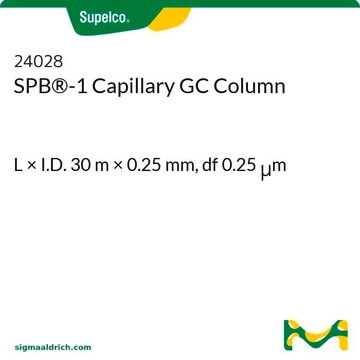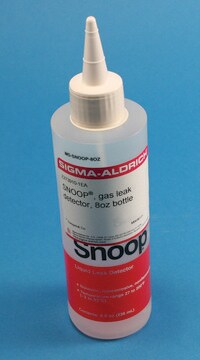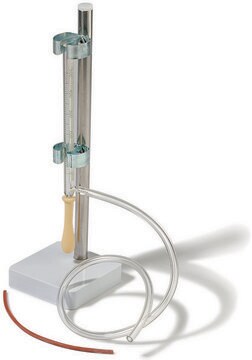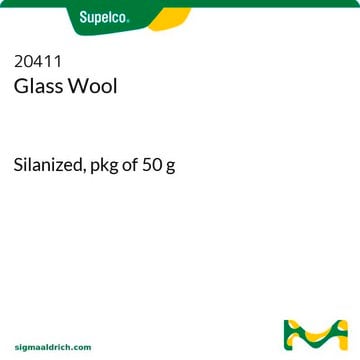28471-U
SLB®-5ms Capillary GC Column
L × I.D. 30 m × 0.25 mm, df 0.25 μm
Synonym(s):
GC column, SPB-5, 5% diphenyl, mass spec
About This Item
Recommended Products
material
fused silica
Quality Level
Agency
Standard Method 6040D
EN 2005/108/EC
EPA 610,625,8015,8082,8100,8141,8270,OLM04.2 SVOA
EPA TO-13,IP-8,8270,525.2,608.1/608.2,608/8081/OLM04.2 PEST
JMHLW
NIOSH 2530,5503
OSHA 62
meets requirements for USP G27 and G36
suitable for EPA 1613
reg. compliance
FDA LIB 4423
parameter
-60-340 °C temperature (isothermal)
-60-360 °C temperature (programmed)
Beta value
250
df
0.25 μm
technique(s)
GC/MS: suitable
gas chromatography (GC): suitable
L × I.D.
30 m × 0.25 mm
matrix active group
Bonded and highly crosslinked; silphenylene polymer virtually equivalent in polarity to poly(5% diphenyl/95% dimethyl siloxane) phase
application(s)
agriculture
chemicals and industrial polymers
cleaning products
clinical
cosmetics
environmental
flavors and fragrances
food and beverages
forensics and toxicology
industrial hygiene
life science and biopharma
personal care
petroleum
pharmaceutical (small molecule)
column type
capillary non-polar
Looking for similar products? Visit Product Comparison Guide
General description
USP Code: This column meets USP G27 and G36 requirements.
Phase:
- Bonded and highly crosslinked
- Silphenylene polymer virtually equivalent in polarity to poly(5% diphenyl/95% dimethyl siloxane)
- ≤0.32 mm I.D.: -60 °C to 340 °C (isothermal) or 360 °C (programmed)
- ≥0.53 mm I.D.: -60 °C to 330 °C (isothermal) or 340 °C (programmed)
Application
- Determination of propargite, tebuconazole and bromopropylate pesticide residues in Taiwan green jujubes by gas chromatography-tandem mass spectrometry.: This study utilized the SLB-5ms Capillary GC Column to analyze pesticide residues in agricultural produce. The method demonstrated high sensitivity and specificity, highlighting the column′s efficacy in complex sample matrices (Zhang et al., 2014).
- Characterisation of capillary ionic liquid columns for gas chromatography-mass spectrometry analysis of fatty acid methyl esters.: The research explored the performance of SLB-5ms Capillary GC Columns for the analysis of fatty acid methyl esters. The column exhibited superior resolution and stability, making it a valuable tool for lipid analysis in biochemical applications (Zeng et al., 2013).
Other Notes
Legal Information
Choose from one of the most recent versions:
Already Own This Product?
Find documentation for the products that you have recently purchased in the Document Library.
Customers Also Viewed
Articles
GC Analysis of Neroli Essential Oil on SLB®-5ms
Resolving by Mass
Learn more about how the thermal desorption technique is applied for terpene identification, profiling, odor measurement, industrial hygiene, and environmental emissions.
Sigma-Aldrich presents an article about the analysis of melamine and related compounds in dog food with the use of more economical gas chromatography-mass spectrometry (GC-MS) instrumentation.
Protocols
GC Analysis of PBDE Flame-Retardant Compounds
Extraction and Analysis of PAHs in Olive Oil using Molecularly Imprinted Polymer SPE and GC-MS
Example displays how MSTFA/MSTFA-d9 derivatization of amphetamine provides valuable information in mass spectra and chromatograms using SLB-5ms GC column.
There are three types of analyses: GRO, DRO, and TPH. The published methods are simply variations of these to meet the different analytical needs of the individual agencies.
Chromatograms
suitable for GC, application for SPMEsuitable for GCsuitable for GC, application for SPMEsuitable for GCShow MoreOur team of scientists has experience in all areas of research including Life Science, Material Science, Chemical Synthesis, Chromatography, Analytical and many others.
Contact Technical Service






